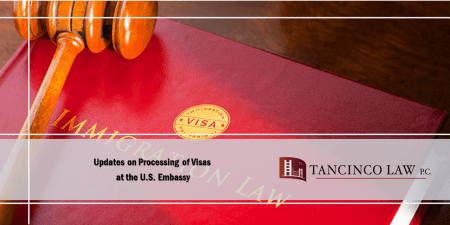According to the U.S. Department of State, the U.S. Embassies and consular offices are using a tiered approach to prioritizing immigrant visa applications based on the category of immigrant visa, as they resume and expand visa services. Where possible, consular officers are scheduling some appointments within all of these four priority tiers every month:
- Tier One: Immediate relative intercountry adoption visas, age-out cases (cases where the applicant will soon no longer qualify due to their age), and certain Special Immigrant Visas (SQ and SI for Afghan and Iraqi nationals working with the U.S. government)
- Tier Two: Immediate relative visas; fiancé(e) visas; and returning resident visas
- Tier Three: Family preference immigrant visas and SE Special Immigrant Visas for certain employees of the U.S. government abroad
- Tier Four: All other immigrant visas, including employment preference and diversity visas
The U.S. Embassy in Manila published on their website that routine visa operational services remain suspended. Based on their announcement, it appears that the consular section is currently processing Tiers One and Tiers Two. In the U.S. Embassy website, it describes what visas are being prioritized.
Immigrant Visa (IV): The Embassy is currently processing limited numbers of the following:
- Cases for applicants previously interviewed and refused under INA Section 221(g) for additional document submission or processing.
- Interviews for any case with a derivative applicant who is turning 21 years old and/or risks losing eligibility as a child or derivative.
- As capacity allows: Interviews for IR-1, CR-1, IW-1, IR-2, CR-2, IR-3, IH-3, IR-4, K-1/2, IH-4, IR-5, SB-1, and I-131A applicants whose cases are already at Post for processing.
- Visa interviews for all other immigrant visa categories remain suspended until local conditions and capacity allows.
Nonimmigrant Visa (NIV): The Embassy continues to prioritize travelers with urgent travel needs, foreign diplomats, and certain mission-critical categories of travelers such as those coming to assist with the U.S. response to the pandemic, followed by students and exchange visitors (F-1, M-1, and J-1) and temporary employment visas (H-1B, H-2B, and L nonimmigrants). Routine visa appointments and processing for B1/B2 (Business/Tourist) remain suspended with the exception of interview waiver cases.
The U.S. Embassy in Manila is processing those visa applicants who were previously interviewed and refused under INA Section 221g. Yet, it also mentions that only a limited number of visa interviews are being conducted. So for preference categories, visa interviews remain suspended. Also, those who are just awaiting for interviews and have no prior interviews will have to be patient and wait until the local COVID-19 situation in the Philippines improves.
Immediate relatives of U.S. citizens are being interviewed “as capacity allows”. This includes minor children, spouses and parents of U.S. citizens. The same rule applies to fiancé visa applicants and returning resident visas even if their visa applications are already in the U.S. Embassy.


